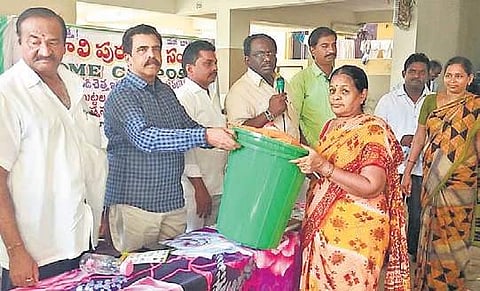Andhra Pradesh: Tenali civic body bats for home composting
GUNTUR: Tenali Municipality Commissioner S Venkata Krishna has said that composting at home is the way forward. The civic officials are creating awareness among people on how to make composting at home. They are also conducting training for apartment residents on two types of composting i.e., aerobic composting and anaerobic composting. The officials have started distributing plastic bins to residents. “We are now encouraging students to motivate their parents to join the initiative,” Venkata Krishna said.
“The compost made at home can be used as fertilizer and plants can be grown. Some families are already growing organic vegetables at no extra cost,” Venkata Krishna said.
MHO BV Ramana appealed to the public to stop usage of plastic. He said the civic body passed a resolution to supply organic bioculum free of cost for making composting in every household. Crediting the citizens for their active participation, Venkata Krishna said people have understood the necessity for segregation and are willing to make small changes in their routine to ensure that waste is disposed off properly.
Now, household kitchen organic wastes can be turned into manure through some simple methods. Under Solid Waste Management Rules, all bulk producers of solid waste such as hotels, restaurants, marriage halls, hostels and educational institutions had to process and dispose their waste. Otherwise, severe action would be taken against them.
What is composting?
Composting is the process of breaking down organic matter into nutrient-rich humus. It is different from rotting because while rotting is decay, accompanied by putrid smell and fungus, composting is slow decomposition — the process that takes place in forests, where layers of leaves slowly break down to become part of the loamy soil, giving you that “forest smell”.
Go green with garden
Collect all green waste and deposit into the composting bin once or twice a day. If possible, chop peels and other waste into small pieces for faster composting. Now, gather the brown waste together.
For every handful of kitchen or ‘green’ waste, add a handful of ‘brown’ waste. Ensure that a layer of browns covers the top layer of the pot. Cover the composting pot tightly, so that small creatures can’t get in. Place a plate underneath to collect any liquid that flows out.
Keep adding ‘green’ and ‘brown’ waste to the pot till it fills up. Then start another pot. Every two or three days, stir to add air into the mix. Leave the filled pot closed. After six to eight weeks, when you open the pot, it will smell like damp earth. Your brown gold is ready to feed your plants.

